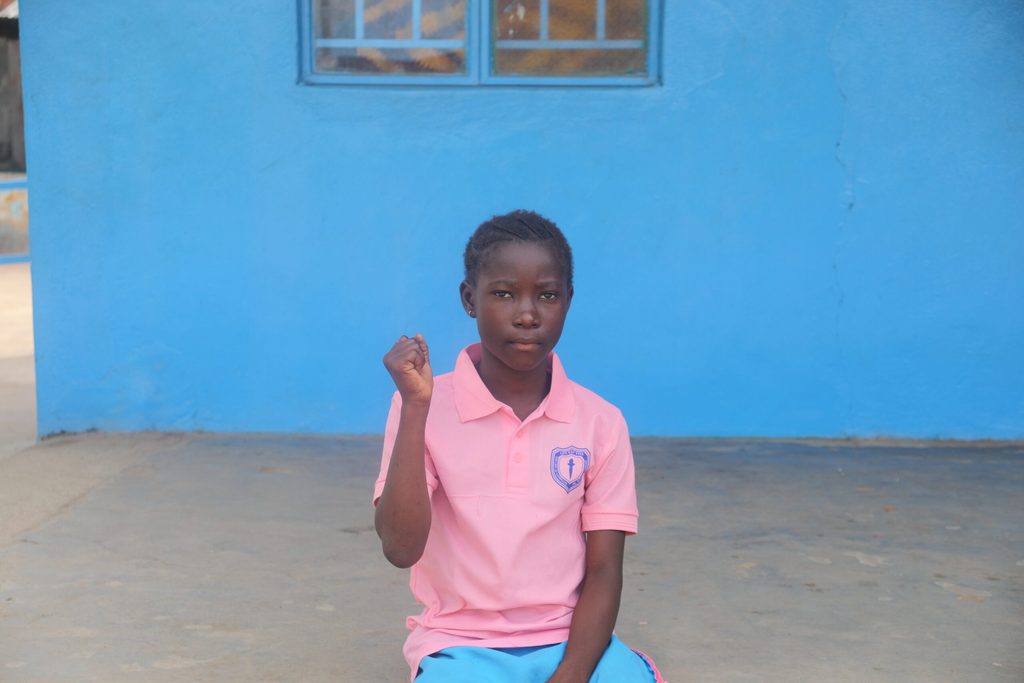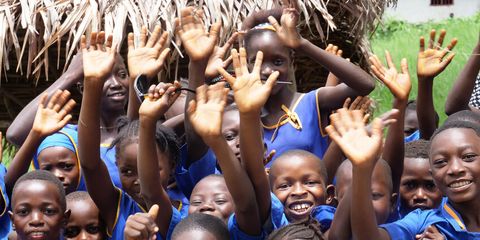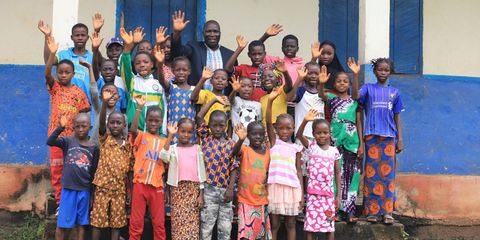The power of a school meal: Kadiatu’s story
Kadiatu’s health and performance at school have improved and she shares how she looks forward to her meal at school each day.
Despite her young age, Kadiatu has already experienced a lot of hardship in her life. She lives with her grandmother, she has never met her mother, and her father does not help take care of her. Her grandmother is old and cannot work, so they struggle to make ends meet.
Kadiatu’s situation was especially difficult when she was attending her previous school. She was unable to pay her school fees, so her primary school teachers helped pay them in exchange for her doing housework for them. This continued until Kadiatu was able to finish primary school.
However, she was still struggling financially, and when she reached fifth grade, she was forced to leave the school due to financial issues. Thankfully, one of Kadiatu’s neighbours brought her to a new primary school, and they were able to take her in without having to pay any tuition fees. Kadiatu was also given school supplies, a uniform, books, and socks, all for free.
But even with the school’s help, Kadiatu’s life remained a struggle. She lives in a rented single room with her grandmother, the house leaks and they have no toilet. Her grandmother pays 50 leones ($2.20) every month for the house, but they have to rely on different people for help. Kadiatu has to wake up at 5 a.m. every day to sweep the house and wash the dishes before heading off to school.
School meals keep children in education
“I look forward to the meal at school every day, as it is the first thing I think about when I wake up, even if I am discouraged with going to school because of my situation,” says Kadiatu. “But just by thinking of the food being served in school, I rush to school because I don’t want to miss out on it.”
“I look forward to the meal at school every day, as it is the first thing I think about when I wake up.”
Kadiatu
Before the school feeding programme by the Government of Sierra Leone through the Ministry of Basic and Senior Secondary Education, implemented by Plan International, Kadiatu attended school without lunch. She would often have to wait until she went home to cook for both her and her grandmother. They could only afford food if they were given money from neighbours or teachers for the day. The situation was difficult for Kadiatu, and it affected her health, making her frequently fall ill.

With the introduction of the school feeding programme, Kadiatu’s life changed. She no longer has to worry about food during the school day, and she even looks forward to the meal every morning. With the school providing her with a healthy meal each day, Kadiatu became more energetic and healthier, and she had more time to study after school, which is a great relief.
Boost for health and learning
The school feeding programme not only gives Kadiatu the ingredients she needs to learn and grow, but it also gives her hope for a better future. Kadiatu dreams of becoming a doctor so she can help people in her community, just as people have helped her throughout her life. She wants to make a difference and break the cycle of poverty that has held her family and her community back for so long.
“The school feeding programme has had a significant impact on the health and well-being of our school children,” says Kadiatu’s teacher, Florence. “It’s not just about providing them with food; it’s also about giving them the energy and motivation to learn and grow. I truly believe that with continued support, these children can achieve great things and break the cycle of poverty in their communities.”
Florence has noticed a significant difference in Kadiatu since the school feeding programme was introduced. Kadiatu no longer falls ill as frequently and is more active in school. Florence is grateful for the school feeding programme, as it not only provides children with food but also gives them the energy and motivation to learn and grow. The teachers are also happier teaching children with full stomachs, and the programme has improved attendance and attention in the classroom. Kadiatu’s story shows us the transformative power of a school meal for children from less privileged communities.



